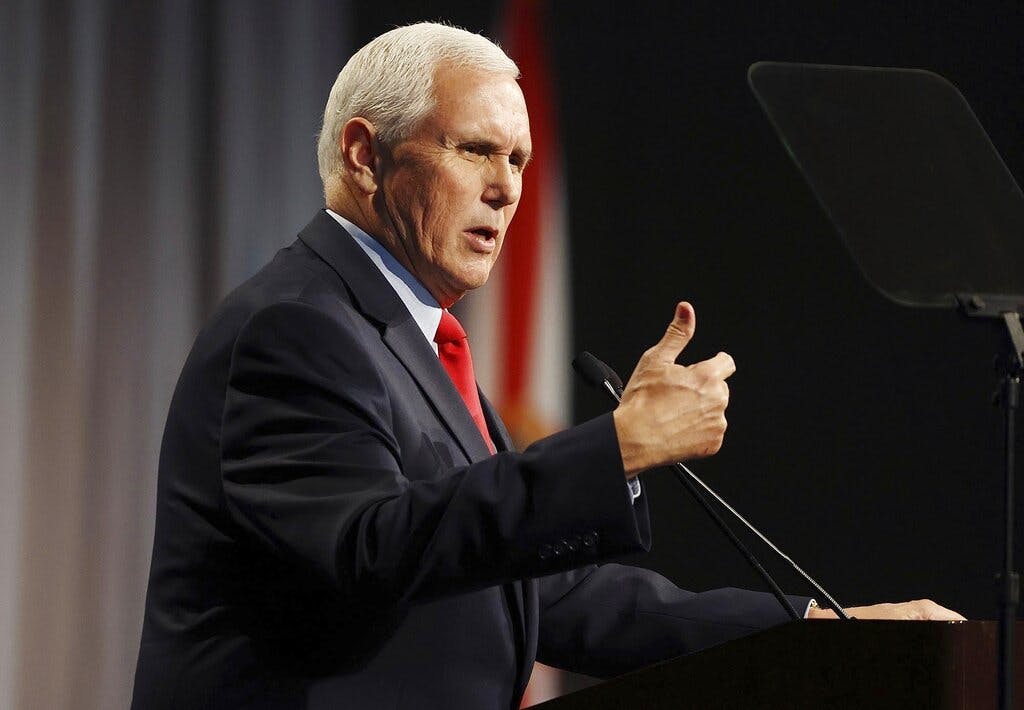As January 6 Committee Reconvenes, the Spotlight Finds Pence, Again
The committee is likely to focus on the clash between President Trump, who clung to office, and Vice President Pence, who clung to the Constitution.

When the January 6 Committee resumes its hearings today, Vice President Pence will likely take center stage, as he did, however briefly, that winter day a year and a half ago.
Representative Elizabeth Cheney has previewed this hearing as one that will focus on “President Trump’s relentless effort on January 6 and in the days beforehand to pressure Vice President Pence to refuse to count lawful electoral votes.”
When it came to Mr. Pence, that pressure assumed a particularly virulent form. Mr. Trump’s onetime chief of staff, Mark Meadows, told the committee that the chief executive responded encouragingly to chants of “Hang Mike Pence” emanating from outside the Capitol.
That anger at Mr. Pence was constitutionally misplaced. The 12th Amendment does not grant the vice president the power that Mr. Trump wanted him to use: “The president of the Senate shall, in the presence of the Senate and House of Representatives, open all the certificates, and the votes shall then be counted.” It is up to the House and Senate to certify the results in certificates the vice president is required to open.
A further statutory guide is the Electoral Count Act of 1887, devised a decade following another disputed election, the 1876 affair between Samuel Tilden and a Civil War hero, Rutherford Hayes.
The act, which elaborates the constitutional directive, sought to minimize Congress’s role in tallying votes, instead routing much of the work to the states. In the wake of the 2020 election, there is a bipartisan push to revise and “fix” the act.
On January 6, though, Mr. Pence’s role, while but a supervisory one, was pivotal. He fulfilled his duty despite pressure from Mr. Trump to refuse certification. The certification proceeded after the crowd had been cleared from Capitol grounds.
Mr. Pence has since reflected that he “did the right thing.” That’s because in referring to the vice president as “president of the Senate,” the Constitution telegraphs that in refusing to kowtow to the president, as Mr. Pence refused to do, the vice president was affirming the autonomy vouchsafed to his office.
That is, the vice president does not report to the president. The president can’t fire him or raise — or lower — his pay. He cannot tell him to fetch so much as a glass of water. The Constitution does not assign the vice president to any particular branch of government, and his only articulated duty is to head the Senate and cast tie-breaking votes in that body, where a well-appointed office suite — known as the Vice President’s Room — is reserved for his use.
On Thursday, the committee is likely to focus on the clash between the coterie committed to keeping Mr. Trump in the Oval Office and Mr. Pence and his circle, who sought to navigate among a volatile president, a rampaging mob, and the national parchment to which he is sworn.
One clip shared by the committee in advance of the hearing shows a White House lawyer, Eric Herschmann, telling a legal adviser to Mr. Trump, John Eastman, in reference to plans to halt certification, “Are you out of your f—ing mind? I said I only want to hear two words coming out of your mouth from now on: Orderly transition.”
Mr. Hershmann is also seen telling Mr. Eastman “get a great f–-ing criminal defense lawyer. You’re going to need it.” Mr. Eastman, an attorney and law professor, has emerged as a pivotal figure in the drama of January 6 as the architect of the legal strategy to keep Mr. Trump in power.
Mr Eastman is currently embroiled in a court battle over which documents related to January 6 must be yielded to the committee and which are shielded by privilege. His focus appears to have been devising legal theories for how Mr. Pence could have inhibited electoral certification.
In a memo obtained by Politico, Mr. Pence’s lawyer, Greg Jacob, opined that by opposing certification, “the Vice President would likely find himself in an isolated standoff against both houses of Congress, as well as most or all of the applicable State legislatures, with no neutral arbiter available to break the impasse.”
Mr. Jacob is due to testify on Thursday, along with another adviser to Mr. Pence, Judge Michael Luttig. The judge, who once rode the Fourth United States appeals circuit, told Frontline that “the plan was to overturn the election through the exploitation of what I’ve called the institutions of democracy.”
Judge Luttig also told Politico “I’m a cut-up, but I’m deadly serious when the time comes, and that day, I was as serious as I can possibly be.” Mr. Eastman served as a law clerk for Judge Luttig, though the course of recent events has now likely placed them on opposing banks of this constitutional chasm.

